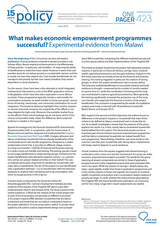Externe Publikationen

What makes economic empowerment programmes successful? Experimental evidence from Malawi
Burchi, Francesco / Christoph StrupatExterne Publikationen (2019)
Brasília: The International Policy Centre for Inclusive Growth (One Pager 423)
Since the beginning of the 21st century we have witnessed a proliferation of social protection schemes in several countries in sub-Saharan Africa. Recent empirical evidence points to the effectiveness of these policies, in particular of the cash transfers (CTs) in improving the ability of beneficiaries to meet their basic needs. However, it seems that CTs alone do not reduce poverty in a sustainable manner and this is usually not even their explicit aim. CT beneficiaries do not manage to exit poverty by their own means and, therefore, remain dependent on the provision of social assistance. For this reason, there have been a few attempts to build integrated, multi-sectorial interventions, such as the BRAC graduation scheme in Bangladesh, then replicated also in some African countries. These programmes typically include a CT for consumption purposes, an asset transfer (or lump-sum grant), various forms of training, mentorship, and community mobilisation for social integration. The empirical literature highlighted their positive impacts on several outcomes: however, the magnitude of the effects is not large despite the high costs. Moreover, the available studies focus on the effects of the overall package; we do not know which of the various components really makes the difference. More empirical evidence is needed in this regard. Against this background, the Deutsche Gesellschaft für Internationale Zusammenarbeit (GIZ) in cooperation with the Government of Malawi and local partners, designed and implemented the Tingathe Economic Empowerment Pilot Project (EEP). It targets ultra-poor and labour-constrained households that are already beneficiaries of the countrywide social cash transfer program. Designed as a cluster-randomised-control-trial, it provides to different village clusters: a) a lump-sum transfer (~70$); b) financial and business training; c) both a lump-sum transfer and training. The training was also meant to encourage beneficiaries to create saving groups. Furthermore, the project beneficiaries were allowed to appoint a proxy, i.e., a person who carries out project-related activities on their behalf. This was considered particularly important for beneficiary households with major labour impediments. The aim of the project is to put beneficiaries onto a “graduation pathway”, i.e., to provide them with the resources necessary to improve their well-being and to lay a foundation with which to escape poverty in the long run. A recent study conducted by the Deutsches Institut für Entwicklungspolitik/German Development Institute (DIE) provided evidence of the impacts of the Tingathe EEP after about one year from implementation (Burchi and Strupat, 2018). The study answered three central questions: 1) what are the impacts of the overall project and of each of the three project components on different outcomes? 2) Do project impacts differ between households that are labour-constrained and those that are non-labour-constrained, based on project definition? 3) Is the proxy option useful? In order to answer these questions, the authors used an experimental design and surveyed about 800 households, comprising the different treatment groups and a control group, before and after the implementation of the Tingathe EEP. The empirical analysis reveals that the project had substantial positive impacts, in particular on financial literacy, savings, loans, livestock wealth, agricultural production, and drought resilience. Impacts on the first three outcomes are entirely driven by the financial and business training. The training triggered in particular the creation of saving groups to which the project beneficiaries had no access before. The lump-sum ensured accumulation of livestock and resilience to drought – measured by the number of months needed to recover from it -, while the training in combination with the lump-sum contributed to improve agricultural production. More in general, the training increased significantly the productive use of the lump-sum transfer and supported the financial inclusion of the project beneficiaries: this conclusion is supported by the results of a qualitative analysis, previously conducted with 30 beneficiary households (Beierl, Burchi and Strupat, 2017). With regard to the second and third objective, the authors found that there are no differences in the project’s impacts between households that meet all the criteria to be defined as “labour-constrained” and those who do not. An in-depth investigation reveals that the presence of the proxy explains this result: it is, in fact, mainly labour-constrained households who benefited from this option. This shows that proxies can be an important part of more inclusive economic empowerment programmes and that labour-constrained households can indeed benefit from such programmes. These findings, therefore, cast some doubt on the common view that poor households with strong labour impediments will always need to depend on social assistance. Overall, evidence from this project suggests that tailored training in combination with a lump-sum and the involvement of a proxy can make economic empowerment projects successful. The results for the group receiving all project components are similar with those of graduation programmes and similar integrated projects that were evaluated after 1 or 2 years. While the impacts on savings - despite being very large - seem slightly lower than those in graduation programmes and in two similar projects in Kenya and Uganda, the impacts on livestock wealth, household consumption and a consumption-based measure of poverty are larger. To verify whether the improvements generated by the Tingathe EEP will ensure beneficiaries’ graduation out of poverty and for how many longer-term impact assessments are needed.Kontakt
Cornelia Hornschild
Koordinatorin Publikationen
E-Mail Cornelia.Hornschild@idos-research.de
Telefon +49 (0)228 94927-135
Fax +49 (0)228 94927-130
Alexandra Fante
Bibliothekarin/Open Access-Koordinatorin
E-Mail Alexandra.Fante@idos-research.de
Telefon +49 (0)228 94927-321
Fax +49 (0)228 94927-130




